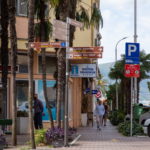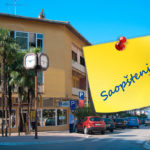Wrapping up Tivat Tourism Think Tank 2022 – Thoughts from the MCs!
To start, tourism isn’t an “industry”, Anna Pollock told us, which implies something controllable: rather, it’s a living, networked, dynamic, ecosystem – and we are all part of it.
It certainly seems uncontrollable with a forecast average growth rate of 5.8% (WTTC) from 2022, meaning the number of tourists will double between now and 2034. Let that sink in – as you think of the busy times now.
The world is facing the climate crisis, biodiversity collapse, droughts, famines, floods, fires… but these are not the problems, these are the symptoms of our broken system. Even ‘do good’ net-positive runs on the existing degenerative system. We need to change the system and introduce new measures of success. Especially when, facing those numbers, we recognise that ‘tourists hate other tourists’. It is essential to now “start re-defining success to the way it is defined throughout the natural world: not as more (quantity) but as better (quality, well-being)”.
In Montenegro, everyone wants space and nature. Space enables recreation that hospitality facilitates for rejuvenation: we are in the business of re-creation. Anna´s Regeneration Lab asked the participants to think together in four dimensions about how the tourism-hospitality sector might contribute to the flourishing / health of the Kotor bay area!
Ulf Sonntag (Institute for Tourism Research in Northern Europe) reminded us that those who are not sun and beach tourists spend more per day and stay practically as long; they fit with what Montenegro has to offer and also come more often outside the summer peak months. He pointed out this exceptionally high gap: Interest for Montenegro in Germany is around 50x bigger than is experienced. The need for better, knowledge-based marketing is obvious, also for further Western and Northern European countries.
Terena Cardwell from Spoonbill Nest Innovation Center in Albania and the Green Coordinator of the first Travelife certified tour operator in the region, Elite Travel Group, pointed out the Balkans have “the longest histories, but institutions seem to have the shortest memories.” This is why we see many projects come and go, and when political change happens, we are often taken “back to square one”, causing a lot of frustration and slow progress. Further, Terena said that tourism may happen physically in cities, communities and nature, but the tourism experience is in the tourist’s mind – we need to build the experience there.
Bruce Yerkovich from Linden Tree Retreat & Ranch in Croatia highlighted that “we are not developed” is wrong! Instead: “we are preserved”. Living in the UN Decade on Ecosystems Restoration this is a big advantage. We must not restore so much as others; it is enough to preserve and protect what we have. He taught us to give ourselves permission to change through travel, which starts with mindset, attitude, purpose and taking responsibility.
For Imbi Lepik-Martinson from Visit Estonia, the pandemic turned into a busy 18 months of doing just that with a sustainable-first mindset for Green Destinations, certifying more than 80 businesses in such a short time and getting 7 Estonian destinations awarded through the development and monitoring process! In the Western Balkans, Tivat has managed to do the same, demonstrating a similar shift from local tourism and marketing focus to a destination management organisation. To the question, how did she manage to get into cooperation with everybody, Imbi looked astonished and said smiling – “oh, we just did”. Communication can be very pragmatic.
Simon Reuter of outdooractive highlighted how traditional marketing channels like magazines and brochures are failing. The future of travel marketing is digital – 80% of website traffic is organic from search engines – but who can cut through now? Platforms offer distribution, reaching the right kind of target groups, triggering communication and sharing. Furthermore, he noted that the promotion of single “highlight” destinations leads to contrasts between overcrowded and underserved places.
On Day 2, Prof. Dr. Claudia Brözel opened with the words,
“Tell me. And I forget.
Show me. And I remember.
Involve me. And I understand.”
We talked about resonance and what this means when we want to change travel (“everybody likes to see a dolphin” – Thalia of the Marine Mammals Research Association (DMAD) shared a convincing change of mindset story she had experienced). Claudia’s talk linked very much with what had been talked about before – us being currently overloaded and in need of connection and communication. “99% of a good conversation means listening.”
The practical side of this happened in the “Magic Round Table” – the first one in the region. There was a call to “humanise tourism in Montenegro”; the key topics were about human resources and how to start building a joint vision and work “bottom up” in our mentally divided country – a phenomenon of many other countries coming through multiple crises. The idea was born to have in each community a team and to start new connections with the help of digital tools that are available today to everyone.
Jeremy Smith (Tourism Declares Climate Emergency / The Glasgow Declaration, The Travel Foundation) joined us to talk about that other big C, climate, in the wake of his visit to COP27 where tourism featured more but now real implementation is tough, and let us know what is required: Commitment, Collaboration, Capacity and Context.
“There’s no point in competing on climate,” he said, as this existential crisis bigger than all of us pulls us together to tackle the shared goal – the same can be said of responsible, sustainable, regenerative tourism overall too.
Vicky Smith (event Co-MC and Founder, Earth-Changers.com) introduced the new 2022 Responsible Tourism Charter. It is an update on the original Cape Town Declaration authored in 2002, upon which global responsible tourism became based, and saw South Africa institute it in government policy for the first time. You can read about the charter here: https://www.earth-changers.com/blog/2022/11/3/the-2022-responsible-tourism-charter
and sign here: https://docs.google.com/forms/d/e/1FAIpQLSdv_ED90KWAnyHxp1bL91htMScJ7rXhI0Tw8WHgjt7iyDsiNA/viewform
– those who sign will be sent priority registration for #TTTT23 where we are planning Professor Harold Goodwin, the author of both the 2002 and 2022 constitutions, to keynote.
Andjela Djokic (Digital Marketing Consultant, My Guide Network, FitCamp Montenegro) and Jovan Radnic (Product Marketing Manager / Co-founder, “Montenegro Digital Nomads & Remote Workers” Community) taught us in ever-evolving digitalisation how connection to the right customers through diversification and targeting is key. Get it right, and people pay not only to visit a donkey sanctuary, but also stay and shovel sh*t!
This behaviour really shifting to the socially and environmentally conscious was echoed by Tadej Rogelja (Faculty of Tourism Studies Turistica Portorož, University of Primorska – Slovenia), such as Locals from Zero’s young talents database and cooperation with fairbnb. His examples of rural tourism and sustainable development practices, including the “open villages concept” , were highly relevant for the regeneration efforts of the region.
Milena Nikolova (Chief Behaviour Officer & Co-founder of BehaviorSMART, Bulgaria) reminded us that small but smart changes stack up at scale; and repetition creates new patterns. Her presentation of how knowledge about human behaviour can make sustainability effortless and a non-negotiable element of good business included many practical examples. She advised us to move forward from “looking for the right travellers to making most travellers the right travellers”.
Finally, Aleksandra Gardašević-Slavuljica, in her role as Director General for Tourism Developing Policies of Montenegro´s current Ministry of Economic Development and Tourism – having lead the working group to develop the Strategy of Tourism Development to 2025 with Action Plan – arrived to share points from that strategy and its operational goals – based on the mission: “Montenegro manages its destination in a sustainable way, creating a green, innovative and inclusive tourist product, based on digitalisation and innovations, influencing the increase in tourist consumption, reducing seasonality and regional disbalance, with the aim of maintaining higher living standards of the local population and tourists satisfaction increase.”
The audience had many questions about the concrete ways of making this happen, partly posed on site and partly shared on a quick digital poll. Those questions will be sent to the Ministry, and published with the answers when received on the event site of https://tivat.travel/tivat-tourism-think-tank-2022/.
Last not least, we were happy to announce:
- the next Tivat Tourism Think Tank: save the date of 15-17 November 2023;
- Those who sign the 2022 Responsible Tourism Charter (linked above) will be the first to receive notification for registration given the limited capacity.
- following the further measures of a “green event”, the CO2 footprint caused by the international flights will be compensated and turned into a donation to the primary school of Tivat, to support their project to plant a green wall that should protect the school from traffic noise and pollution;
- after the morning meeting of Balkan Green representatives with several local tourism organisations from Montenegro and the region, a first cross-border webinar and experience exchange opportunity on the Green Destinations development and monitoring process took place on the 30th November; a next one will be offered in the last week of January 2023.






